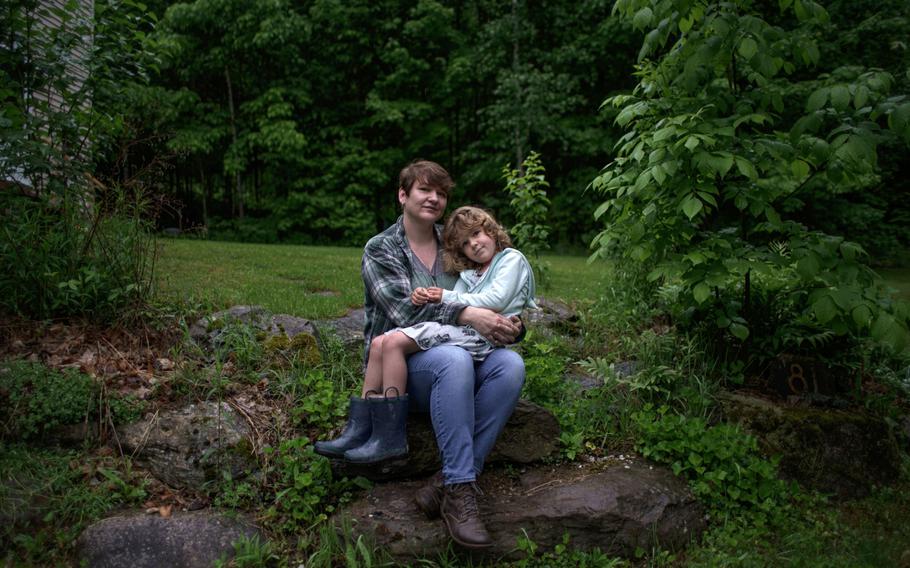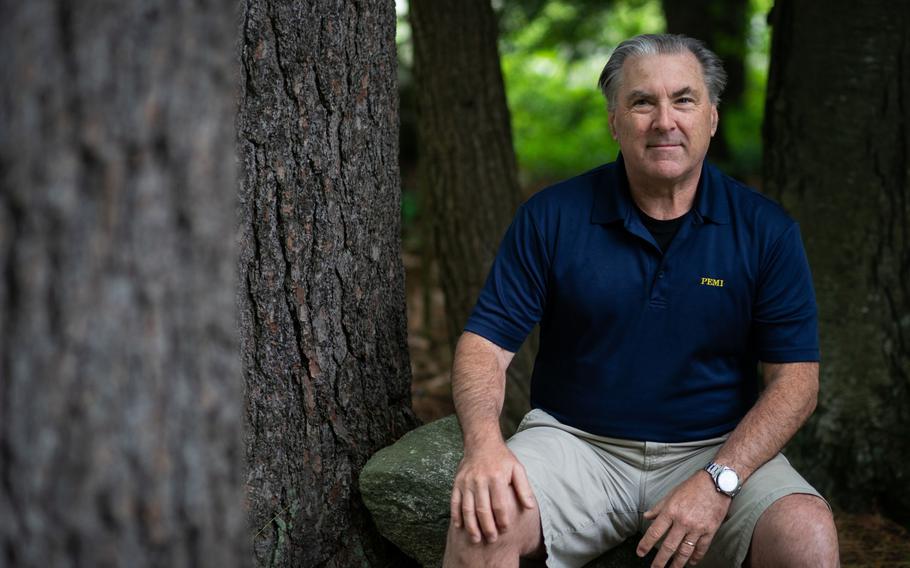
Molly Martin and her daughter, Varya Smith-Martin, 6, at their home in Hinesburg, Vt., on May 31. Martin has been searching for a summer camp for Varya but said that vacancies have been few. (John Tully/Bloomberg)
Pandemic-induced challenges and a fevered hunt for child care are making the lead-up to this year's summer camp season the most stressful ever.
The old-fashioned American institution serves a particularly important role this year, not only freeing parents to jump back into their own jobs, but providing children social and psychological relief after more than a year stuck at home in front of computer screens. The U.S. Centers for Disease Control and Prevention last week loosened its guidance in hopes of allowing as normal a summer as possible.
"As of now, my kiddo is on three waitlists," said Molly Martin, a mother from Hinesburg, Vt., in search of summer care for her 6-year-old daughter Varya. "I was able to find a camp with an opening, but it's a two-hour round trip, so I'm hoping one of the waitlist camps will open up."
At Washington state's Four Winds Westward Ho, which offers $1,600-per-week sessions that include horseback riding, archery and sailing on a 61-foot yawl, parents of second-, third- and even fourth-generation campers have tried to nudge their offspring higher on the waitlist.
"They'll name-drop, or something like that," said Paul Sheridan, executive director of the nearly century-old camp. "It's frustrating, and parents want to try whatever they think is appropriate or can increase their chances."
As economies lurch back into life, work forces and supply chains are disrupted in industries from computer chips to auto-making, and summer camps are no different.
In a normal year, the $20 billion U.S. industry employs over a million people and serves almost 16 million overnight campers, according to the American Camp Association. The singalongs, canoe voyages and capture-the-flag mayhem are a chance for children to enjoy controlled adventure and for parents to enjoy blissful solitude.
They need it more than ever after a pandemic that killed almost 600,000 Americans. Mothers between 25 and 54, who shoulder the bulk of child-care duties, remain out of the workforce at higher rates than everyone else, according to the Federal Reserve Bank of San Francisco.
Kids themselves must recuperate from months of indoor isolation.
"We have all been in a marathon and not a sprint. When you finish a marathon you celebrate briefly and then go rest," said Madeline Levine, a San Francisco psychologist and author who has written about preparing children to face an uncertain world. "Getting kids out in nature and with their own age group is critically important right now."
The rush to get kids enrolled adds to the usual hassles: homesick campers, helicopter parents, wildfires and lawsuits. Throw in the still-potent virus and the labor shortage, and you have the potential for more chaos than a lice outbreak.
In Maine, campers who did turn up last year all came from the common experience of lockdown, said Ron Hall, executive director of Maine Summer Camps, which represents more than 140 camps. Now, they'll arrive from any number of home and schooling situations. While the federal government has approved the Pfizer-BioNTech vaccine for children between 12 and 15, camps anticipate that most won't have received their second dose -- if they've been vaccinated at all.
"In some ways, this year is more difficult than last year," Hall said.
Maine was one of a handful of states that allowed camps to operate last summer, but only about 20% opened the cabin doors. This year, all are set to open at 80% capacity, though some are operating only as day camps. Hall said parents are taking what they can get.
"Day camps mostly are already full, and it's not the norm," he said.
New guidance from the CDC says that fully vaccinated campers will no longer need to wear masks or practice social distancing for the coming season after the agency received criticism for its previous, stricter recommendations. The agency said the guidance is meant to supplement, not replace, other regulations.
For camps, the challenge of reopening after many missed the entire 2020 season will be substantial as they struggle to find workers. Before the pandemic, U.S. summer camps each year enlisted about 25,000 foreign workers, many of them college students, as counselors.
With international travel constrained, only about 13% of overnight camps had any foreign staff in 2020, down from 73% in 2018, according to an American Camping Association survey. Visa programs were reinstated in March, but processing has been delayed by limited U.S. embassy and consulate services due to the pandemic.
Hall said that in Maine, usually a third of all of camp staff are students with visas allowing them to work for the summer. Many domestic employees have moved on after missing the 2020 season.
"It's very much up in the air and we are starting to go to plan B," said Danny Kerr, director of Camp Pemigewassett in New Hampshire, the country's oldest sleepaway boys' camp still owned by the original family. Even with a shortage of help, Kerr said, he is "blessed with a team of senior staff," who return each summer. "Our graybeards are all back," he said.

Danny Kerr, director of Camp Pemigewassett, poses for a portrait in Keene, N.H., on May 28. “This summer more than ever, kids really need camp,” said Kerr of Pemigewassett. “We’ve had to turn away a number of families.” (Elizabeth Frantz/Bloomberg)
Even camps less dependent on foreign workers are struggling. Adam Boyd, executive director of Camp Merri-Mac and Camp Timberlake in Black Mountain, N.C., said his usual contingent recruited from Christian campus ministries isn't showing up.
"There's an inertia when you have college students that have been home, and have a Netflix account that works just fine and parents that cook for them," he said.
Meanwhile, the onslaught of parents and children is unrelenting. "This summer more than ever, kids really need camp," said Kerr of Pemigewassett. "We've had to turn away a number of families."
He's hard pressed to accommodate them: State guidelines forced him to cut his usual 168-child sessions to 160.
Increasing the space crunch, some farsighted families rolled their canceled 2020 tuition to 2021, locking up cots. That turned out to be a smart decision, given the demand upswing.
"We had a feeling that after America was locked down for a year, there was going to be in a huge rush to have their kids experience normalcy," said Joe Deoudes, an executive at a digital advertising firm from Bethesda, Md., whose 13-year-old son is off to camp in Connecticut.